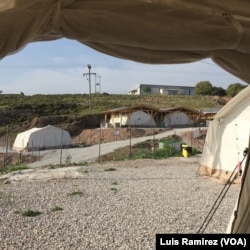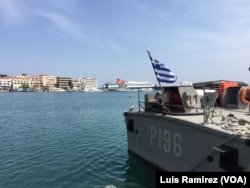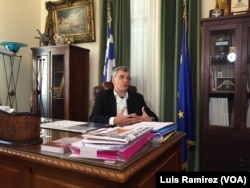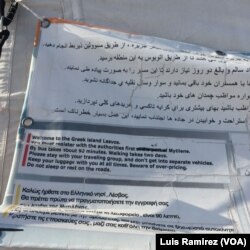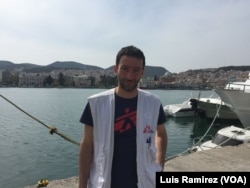Hours before the scheduled start of the deportation of hundreds of migrants from the island of Lesbos, Greek officials had yet to finalize their plans under a deal between the European Union and Turkey.
Activists in Lesbos planned a protest for Monday when Greek authorities, with the help of hundreds of border police officers from EU countries, were to escort migrants from the Moria migrant detention camp outside the island’s main city of Mytilini to a port where ferries were to take them back to Turkey.
The migrants of various nationalities arrived illegally on Greek shores and were detained after authorities deemed them ineligible for asylum.
Officials with the Greek government and Frontex, the EU border agency, gave few details about the operation, which has sparked outrage among human rights activists and leftists across Europe who say the deportation of people whose lives could be at risk in Turkey amounts to a humanitarian atrocity.
With fewer than 24 hours to go before the scheduled start of the migrants’ removal, Greek officials said they were still deciding on how to carry out the plan.
Border guards, EU specialists
Officials said many of the more than 2,000 border guards and other EU specialists had arrived in Lesbos by Sunday and are ready to start the operation.
In Mytilini’s port, a cutter of Britain’s Border Force was moored near the dock where ferries are expected to load the refugees.
But plans appeared far from complete as officials revealed what they said was an obstacle to the implementation of the agreement: Turkey’s failure to stop the influx of migrants as it committed to do in the deal.
'Turkey is not ready'
George Kyritsis, the spokesman for the Greek government’s refugee and migration crisis response operations, told VOA “Turkey is not ready” to implement the deal. “The influx (of migrants arriving from Turkey) remains very high.”
Kyritsis said an average of 500 have continued to arrive in Greece daily since the agreement was announced more than two weeks ago.
“These numbers are not sustainable. If we send back 500 and 500 arrive every day, then we are at zero,” he said.
Turkey has rejected charges that it is not handling the crisis properly.
The number of new arrivals, although still high, has dropped considerably in the past two weeks and fewer than 4,000 migrants remain on the island.
VOA observed several camps largely deserted. At one on a hilltop near the village of Mantamados, wind blew through empty tents.
Officials with humanitarian organizations working on Lesbos said the reasons for the drop in new arrivals are unclear. While not discounting the possibility that many migrants are being deterred by news that they are no longer accepted in Greece, they said recent bad weather conditions on the Aegean could also account for the drop.
Scrambling
They said Greek authorities and the EU are scrambling to deal with pressure the deal has placed on them, as well as the need to relieve overcrowding at the largest of the detention centers at Moria, which was designed to house 2,000 migrants, but now holds about 3,000.
Michele Telaro, field coordinator for Medecins Sans Frontieres, or Doctors without Borders, calls the deal between the European Union and Turkey unreasonable and said all procedures to send people back have not been put in place.
“The MSF has a lot of concerns about the agreement in general, but apart from these concerns, it was obviously completely crazy to pretend to sign an agreement on Friday night and to start to implement it on Sunday. Greece was not ready, Turkey is not ready,” Telaro told VOA.
'Country without borders'
As he spoke, a passerby approached and, referring to the organization’s name, said in Greek, “You are going to make this into a country without borders.”
With tensions rising inside the camps among migrants desperate not to be returned and citizens in Greece and across Europe demanding a solution to the migrant crisis, officials are trying to handle Monday’s operation carefully.
Few, if any, media will be allowed close-up access when they transfer migrants aboard buses from the Moria camp to the port.
In a VOA interview at Mytilini’s old town hall, Lesbos Mayor Spyros Galinos said he believes Europe’s image and future are at stake on Monday.
“Today, Europe is at a crossroads. One way it leads to an enlightened Europe of hope, of peace, of solidarity, one that defends human values and the other to a dark, Fascist past,” he said.





